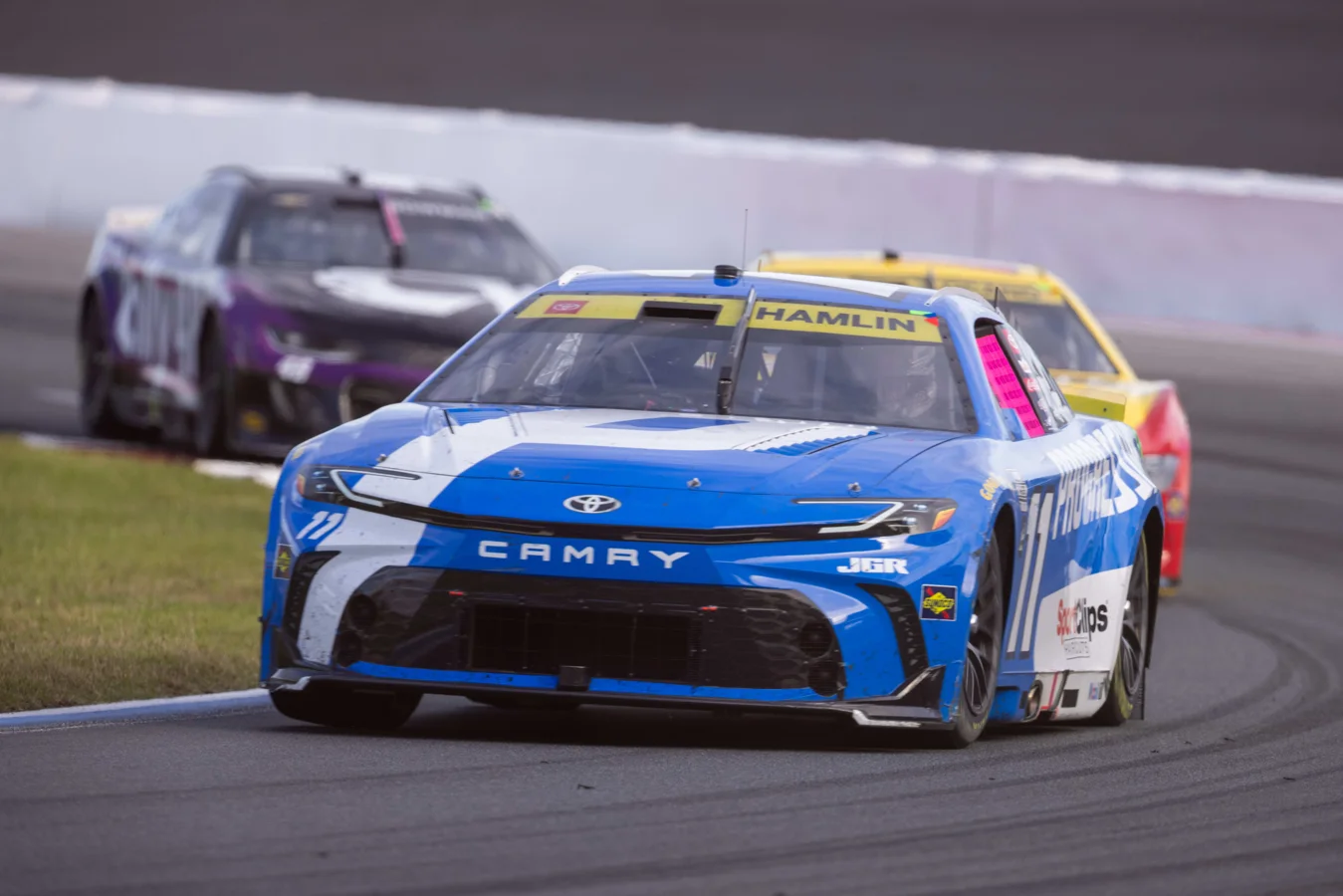The Denny Hamlin ROVAL controversy became a flashpoint in NASCAR‘s tense playoff battle after his driving tactics at Charlotte significantly influenced which drivers advanced. Denny Hamlin, representing Joe Gibbs Racing, made pivotal decisions during the Bank of America ROVAL 400 that drew public attention and ignited heated debate among fans and insiders.
Hamlin, recognized for his aggressive racecraft, has been subject to intensive scrutiny throughout recent playoff events. Entering the Charlotte ROVAL, he faced skepticism about his on-track choices, and his actions during the race only deepened the intrigue. Though Hamlin openly justified his decisions, many fans remained unconvinced, fueling the ongoing discussion around his role in shaping the playoff outcome.
The Charlotte ROVAL: How Hamlin’s Decisions Changed the Playoff Dynamics
Starting from the fourteenth position, Hamlin began the contest behind front-runner Tyler Reddick of 23XI Racing. By the end of the first stage, Hamlin had improved to eleventh place, narrowly missing the top ten. However, his progress faltered in the second stage, where he slipped back and finished twenty-fifth. The drama escalated during the final laps, as Hamlin battled Ross Chastain for twelfth place, setting the stage for unprecedented playoff consequences.
Ross Chastain, needing a strong finish to move past Team Penske‘s Joey Logano in the standings, attempted a bold move coming off turn 7. Hamlin, running just ahead, became the target of Chastain’s aggressive passing effort. This risky maneuver led to contact between the two cars, causing both to spin out, while Logano slipped past to claim twentieth position and a crucial spot in the next playoff round. Chastain and Hamlin crossed the line in twenty-first and twenty-third, with Chastain’s misfortune eliminating his title hopes.

Insider Perspectives: Breaking Down the Final-Lap Incident
In the aftermath, journalists Jeff Gluck and Jordan Bianchi analyzed the race’s conclusion, focusing on whether Hamlin acted with full awareness of the playoff stakes. Gluck questioned Hamlin’s calculations during the closing battle, while Bianchi revisited the sequence in detail:
“There’s a bunch of cars on new tires catching Chastain, and they blew by. The No. 11 [Hamlin] was clipping off fast laps and got to the No. 1 [Chastain] and looked like they were going to blow by him. Then Hamlin slowed down – I haven’t looked at the time, so this is me telling you what others said – he slowed down and seemed to back off from wanting to pass Chastain.”
— Jordan Bianchi, Journalist
Bianchi raised the possibility that Hamlin’s actions might have been calculated to influence which competitor advanced, possibly favoring Chastain over Logano. To clarify intent, Bianchi asked Hamlin directly if he had eased off:
“I knew the 1 was racing for the playoff spot, the transfer spot. I didn’t want to do anything that was going to cost him one way or another. I didn’t want to get into him. I wanted to be respectful, and that is why I backed off.”
— Denny Hamlin, Driver
Despite Hamlin’s insistence, tension remained over whether his conduct was sportsmanlike or strategic manipulation. Notably, as Chastain forced his pass and chaos ensued, Hamlin maintained that he did not intend to enable Joey Logano’s advancement and prioritized his own result.
The Fallout: Eliminations, Advancements, and Lasting Implications
While Hamlin was secured by his cumulative points and would move forward regardless of the outcome, Chastain paid the highest price, losing enough ground to fall out of the playoffs. The collision not only shifted the competitive landscape but also rekindled fierce debate about the integrity and sportsmanship involved in late-race playoff duels.
With the Denny Hamlin ROVAL controversy now central to NASCAR’s postseason narrative, figures such as Hamlin, Jeff Gluck, Ross Chastain, Jordan Bianchi, and Joey Logano remain key in ongoing discussions. Fans and insiders closely watch how these events may influence future driver relationships, NASCAR’s playoff format, and the reputation of organizations like Joe Gibbs Racing and Team Penske. As action returns to the track, the reverberations from Charlotte ensure that scrutiny and speculation will only intensify in the races ahead.


